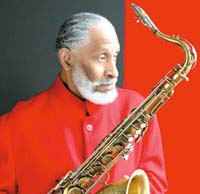Sonny Rollins: I still practice everyday

He did jail time on Rikers Island, played the requisite dances with record labels and pioneered the bass-drum saxophone accompaniment known as strolling.
The images of him blowing his tenor saxophone on the lower level of New York's Williamsburg bridge are an indispensable part of jazz culture. Sonny Rollins has been rocking the tenor sax since 1946 and he has no intention of giving it up now.
"I'm raring to go because I'm a very serious musician," he said in a telephone interview. "I still practice everyday. I'm still studying and learning. You never learn all of music."
Rollins is in the midst of a two-week tour of Western Europe, and Wednesday night at the BOZAR concert hall in Brussels, the 77-year-old proved he's still got it.
Not that there was any doubt.
Wednesday's audience varied in age, with many parents bringing their teenage children. In Europe, jazz is passed from generation to generation.
"I love the fact that Europe has a history of music appreciation," Rollins said. "The United States is a younger country, although we're getting old fast. I find the audiences have a certain amount of gravitas and understanding of musical culture (in Europe). Europe has always been hospitable to jazz musicians, and they have expressed their love for it in return."
Dressed in brown slacks, a white tunic and his trademark sunglasses, Rollins entered slowly but steadily to rousing applause and jumped right in to the original composition "Nice Lady" as the lights changed from red to blue.
With his rocky gait and stooped shoulders, Rollins' age is showing, but he is still golden in his golden years, playing the brass with the energy of a 25-year-old.
Every time he pauses for a breath and starts up again, the audience erupts.
"Each city has their own aura, and that's why when I play in someplace like Liege (in eastern Belgium) it's a completely different feeling than when I play in Brussels," Rollins said. "Each place is different. I have fans all over, fortunately, so I shouldn't try to make differentiations. I always feel different in the south of France than I do in Rome."
He spoke admiringly of "being in all these places I read about when I was in school, in my history books."
History is something the Harlem native keeps near and dear. After all, he is among the last of a sterling generation of jazz musicians that includes Fats Waller, Thelonious Monk, Coleman Hawkins and Louis Jordan.
After opening Wednesday's show with "Nice Lady," he paid homage to Duke Ellington, striking up "In the Center of the World."
"We want to honor all the great musicians who have tried to alleviate the stupid problems of the world," Rollins said.
While honoring his peers and predecessors, Rollins is also looking to the future. He cites contemporary jazzists Kenny Garrett, James Carter, Joshua Redman and Roy Hargrove as "very capable of carrying on the music."
"They have a formidable past because the 1950s was the golden age of jazz," Rollins said. "There were so many innovators and there was so much done. Jazz, like everything else, goes in cycles; there'll be other high points if we keep the world alive."
Subscribe to Pravda.Ru Telegram channel, Facebook, RSS!





